Audit and Assurance: Ethical Considerations and Objectivity Principles
VerifiedAdded on 2021/04/16
|10
|2876
|92
Report
AI Summary
This report analyzes the principles of audit and assurance, focusing on the critical concept of auditor objectivity and independence. It examines various factors that can compromise an auditor's objectivity, including undue financial dependence on a client, financial interests, family ties, provision of non-audit services, and long tenures as the external auditor. For each factor, the report outlines the associated threats to objectivity, potential consequences, and recommended safeguards to mitigate risks and ensure the integrity of the audit process. The report emphasizes the role of the International Ethics Standard Board for Accountants (IESBA) in setting ethical standards and provides practical recommendations for maintaining auditor independence and upholding ethical principles in the audit process. It stresses the importance of unbiased judgment and adherence to ethical codes to ensure the reliability and fairness of financial reporting. The report provides an in-depth analysis of how different situations can impact the independence and objectivity of auditors.
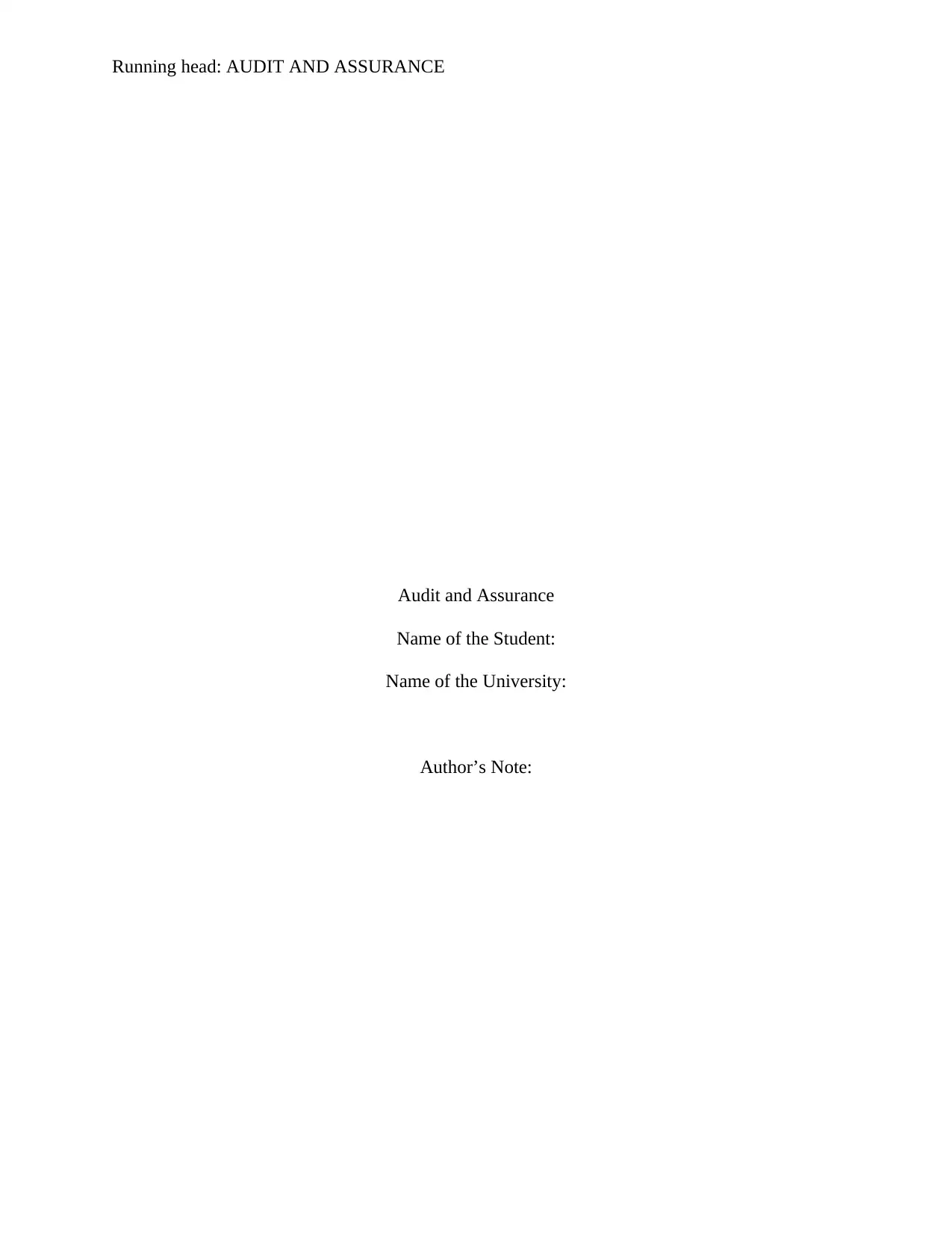
Running head: AUDIT AND ASSURANCE
Audit and Assurance
Name of the Student:
Name of the University:
Author’s Note:
Audit and Assurance
Name of the Student:
Name of the University:
Author’s Note:
Paraphrase This Document
Need a fresh take? Get an instant paraphrase of this document with our AI Paraphraser
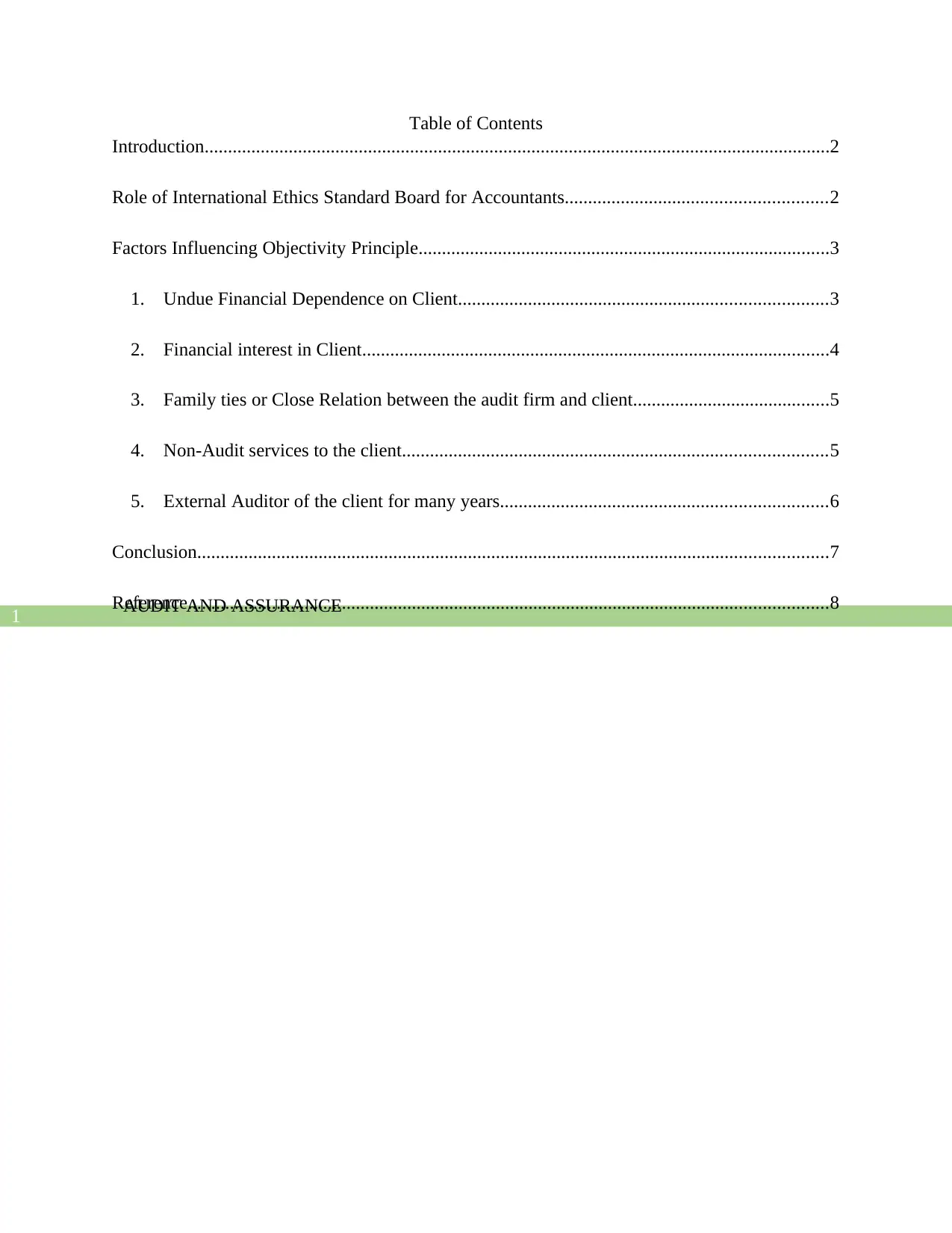
AUDIT AND ASSURANCE
1
Table of Contents
Introduction......................................................................................................................................2
Role of International Ethics Standard Board for Accountants........................................................2
Factors Influencing Objectivity Principle........................................................................................3
1. Undue Financial Dependence on Client...............................................................................3
2. Financial interest in Client....................................................................................................4
3. Family ties or Close Relation between the audit firm and client..........................................5
4. Non-Audit services to the client...........................................................................................5
5. External Auditor of the client for many years......................................................................6
Conclusion.......................................................................................................................................7
Reference.........................................................................................................................................8
1
Table of Contents
Introduction......................................................................................................................................2
Role of International Ethics Standard Board for Accountants........................................................2
Factors Influencing Objectivity Principle........................................................................................3
1. Undue Financial Dependence on Client...............................................................................3
2. Financial interest in Client....................................................................................................4
3. Family ties or Close Relation between the audit firm and client..........................................5
4. Non-Audit services to the client...........................................................................................5
5. External Auditor of the client for many years......................................................................6
Conclusion.......................................................................................................................................7
Reference.........................................................................................................................................8
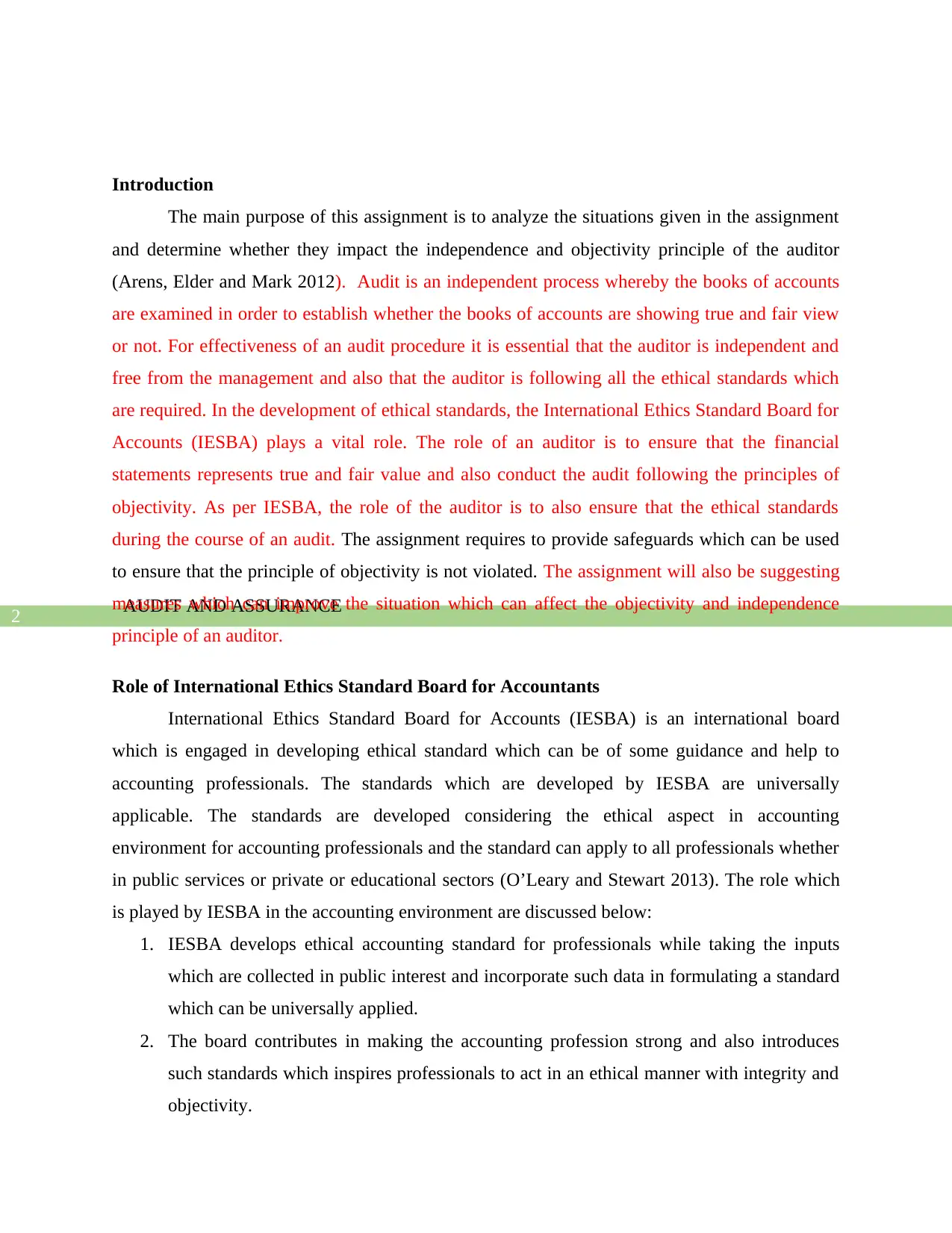
AUDIT AND ASSURANCE
2
Introduction
The main purpose of this assignment is to analyze the situations given in the assignment
and determine whether they impact the independence and objectivity principle of the auditor
(Arens, Elder and Mark 2012). Audit is an independent process whereby the books of accounts
are examined in order to establish whether the books of accounts are showing true and fair view
or not. For effectiveness of an audit procedure it is essential that the auditor is independent and
free from the management and also that the auditor is following all the ethical standards which
are required. In the development of ethical standards, the International Ethics Standard Board for
Accounts (IESBA) plays a vital role. The role of an auditor is to ensure that the financial
statements represents true and fair value and also conduct the audit following the principles of
objectivity. As per IESBA, the role of the auditor is to also ensure that the ethical standards
during the course of an audit. The assignment requires to provide safeguards which can be used
to ensure that the principle of objectivity is not violated. The assignment will also be suggesting
measures which can improve the situation which can affect the objectivity and independence
principle of an auditor.
Role of International Ethics Standard Board for Accountants
International Ethics Standard Board for Accounts (IESBA) is an international board
which is engaged in developing ethical standard which can be of some guidance and help to
accounting professionals. The standards which are developed by IESBA are universally
applicable. The standards are developed considering the ethical aspect in accounting
environment for accounting professionals and the standard can apply to all professionals whether
in public services or private or educational sectors (O’Leary and Stewart 2013). The role which
is played by IESBA in the accounting environment are discussed below:
1. IESBA develops ethical accounting standard for professionals while taking the inputs
which are collected in public interest and incorporate such data in formulating a standard
which can be universally applied.
2. The board contributes in making the accounting profession strong and also introduces
such standards which inspires professionals to act in an ethical manner with integrity and
objectivity.
2
Introduction
The main purpose of this assignment is to analyze the situations given in the assignment
and determine whether they impact the independence and objectivity principle of the auditor
(Arens, Elder and Mark 2012). Audit is an independent process whereby the books of accounts
are examined in order to establish whether the books of accounts are showing true and fair view
or not. For effectiveness of an audit procedure it is essential that the auditor is independent and
free from the management and also that the auditor is following all the ethical standards which
are required. In the development of ethical standards, the International Ethics Standard Board for
Accounts (IESBA) plays a vital role. The role of an auditor is to ensure that the financial
statements represents true and fair value and also conduct the audit following the principles of
objectivity. As per IESBA, the role of the auditor is to also ensure that the ethical standards
during the course of an audit. The assignment requires to provide safeguards which can be used
to ensure that the principle of objectivity is not violated. The assignment will also be suggesting
measures which can improve the situation which can affect the objectivity and independence
principle of an auditor.
Role of International Ethics Standard Board for Accountants
International Ethics Standard Board for Accounts (IESBA) is an international board
which is engaged in developing ethical standard which can be of some guidance and help to
accounting professionals. The standards which are developed by IESBA are universally
applicable. The standards are developed considering the ethical aspect in accounting
environment for accounting professionals and the standard can apply to all professionals whether
in public services or private or educational sectors (O’Leary and Stewart 2013). The role which
is played by IESBA in the accounting environment are discussed below:
1. IESBA develops ethical accounting standard for professionals while taking the inputs
which are collected in public interest and incorporate such data in formulating a standard
which can be universally applied.
2. The board contributes in making the accounting profession strong and also introduces
such standards which inspires professionals to act in an ethical manner with integrity and
objectivity.
⊘ This is a preview!⊘
Do you want full access?
Subscribe today to unlock all pages.

Trusted by 1+ million students worldwide
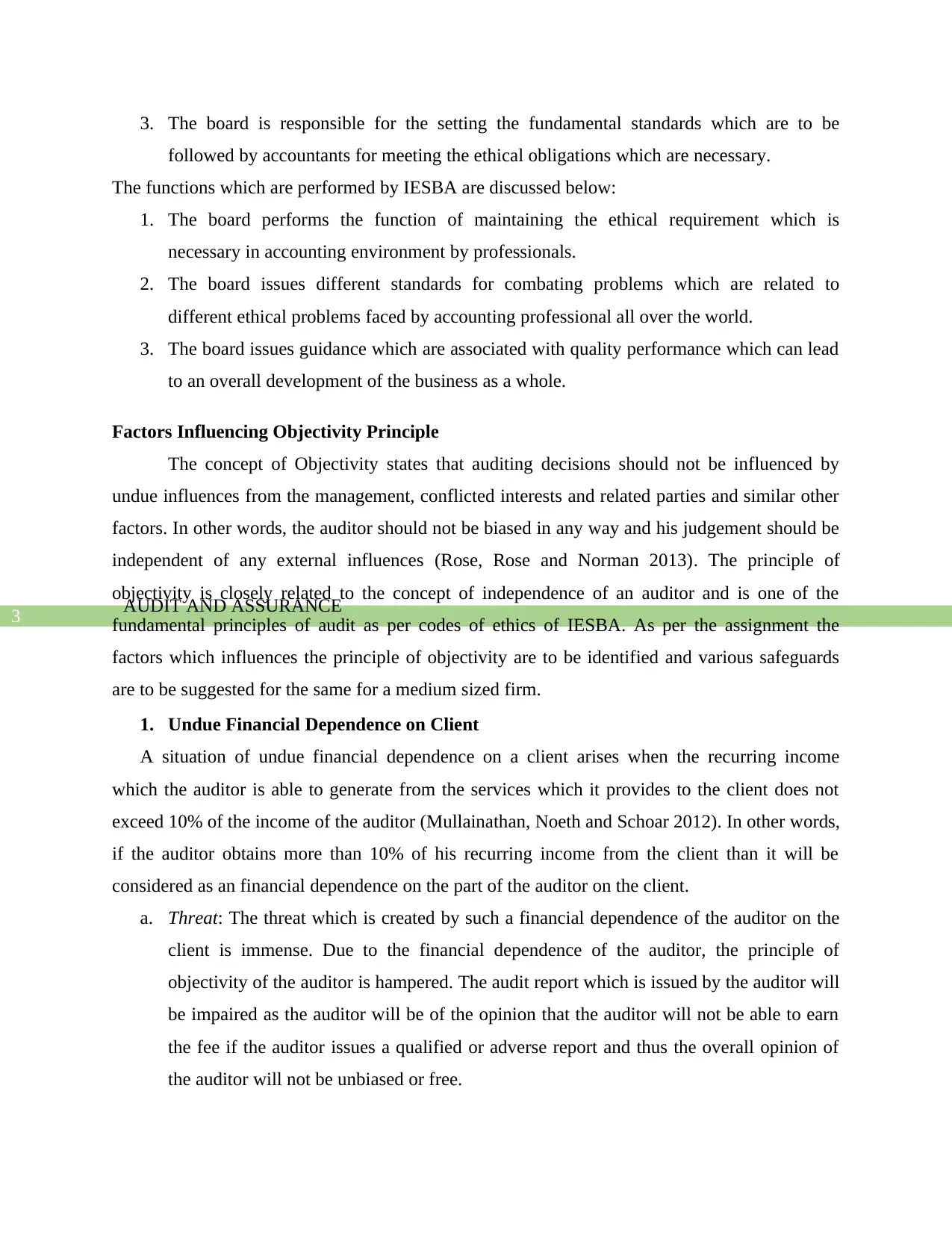
AUDIT AND ASSURANCE
3
3. The board is responsible for the setting the fundamental standards which are to be
followed by accountants for meeting the ethical obligations which are necessary.
The functions which are performed by IESBA are discussed below:
1. The board performs the function of maintaining the ethical requirement which is
necessary in accounting environment by professionals.
2. The board issues different standards for combating problems which are related to
different ethical problems faced by accounting professional all over the world.
3. The board issues guidance which are associated with quality performance which can lead
to an overall development of the business as a whole.
Factors Influencing Objectivity Principle
The concept of Objectivity states that auditing decisions should not be influenced by
undue influences from the management, conflicted interests and related parties and similar other
factors. In other words, the auditor should not be biased in any way and his judgement should be
independent of any external influences (Rose, Rose and Norman 2013). The principle of
objectivity is closely related to the concept of independence of an auditor and is one of the
fundamental principles of audit as per codes of ethics of IESBA. As per the assignment the
factors which influences the principle of objectivity are to be identified and various safeguards
are to be suggested for the same for a medium sized firm.
1. Undue Financial Dependence on Client
A situation of undue financial dependence on a client arises when the recurring income
which the auditor is able to generate from the services which it provides to the client does not
exceed 10% of the income of the auditor (Mullainathan, Noeth and Schoar 2012). In other words,
if the auditor obtains more than 10% of his recurring income from the client than it will be
considered as an financial dependence on the part of the auditor on the client.
a. Threat: The threat which is created by such a financial dependence of the auditor on the
client is immense. Due to the financial dependence of the auditor, the principle of
objectivity of the auditor is hampered. The audit report which is issued by the auditor will
be impaired as the auditor will be of the opinion that the auditor will not be able to earn
the fee if the auditor issues a qualified or adverse report and thus the overall opinion of
the auditor will not be unbiased or free.
3
3. The board is responsible for the setting the fundamental standards which are to be
followed by accountants for meeting the ethical obligations which are necessary.
The functions which are performed by IESBA are discussed below:
1. The board performs the function of maintaining the ethical requirement which is
necessary in accounting environment by professionals.
2. The board issues different standards for combating problems which are related to
different ethical problems faced by accounting professional all over the world.
3. The board issues guidance which are associated with quality performance which can lead
to an overall development of the business as a whole.
Factors Influencing Objectivity Principle
The concept of Objectivity states that auditing decisions should not be influenced by
undue influences from the management, conflicted interests and related parties and similar other
factors. In other words, the auditor should not be biased in any way and his judgement should be
independent of any external influences (Rose, Rose and Norman 2013). The principle of
objectivity is closely related to the concept of independence of an auditor and is one of the
fundamental principles of audit as per codes of ethics of IESBA. As per the assignment the
factors which influences the principle of objectivity are to be identified and various safeguards
are to be suggested for the same for a medium sized firm.
1. Undue Financial Dependence on Client
A situation of undue financial dependence on a client arises when the recurring income
which the auditor is able to generate from the services which it provides to the client does not
exceed 10% of the income of the auditor (Mullainathan, Noeth and Schoar 2012). In other words,
if the auditor obtains more than 10% of his recurring income from the client than it will be
considered as an financial dependence on the part of the auditor on the client.
a. Threat: The threat which is created by such a financial dependence of the auditor on the
client is immense. Due to the financial dependence of the auditor, the principle of
objectivity of the auditor is hampered. The audit report which is issued by the auditor will
be impaired as the auditor will be of the opinion that the auditor will not be able to earn
the fee if the auditor issues a qualified or adverse report and thus the overall opinion of
the auditor will not be unbiased or free.
Paraphrase This Document
Need a fresh take? Get an instant paraphrase of this document with our AI Paraphraser
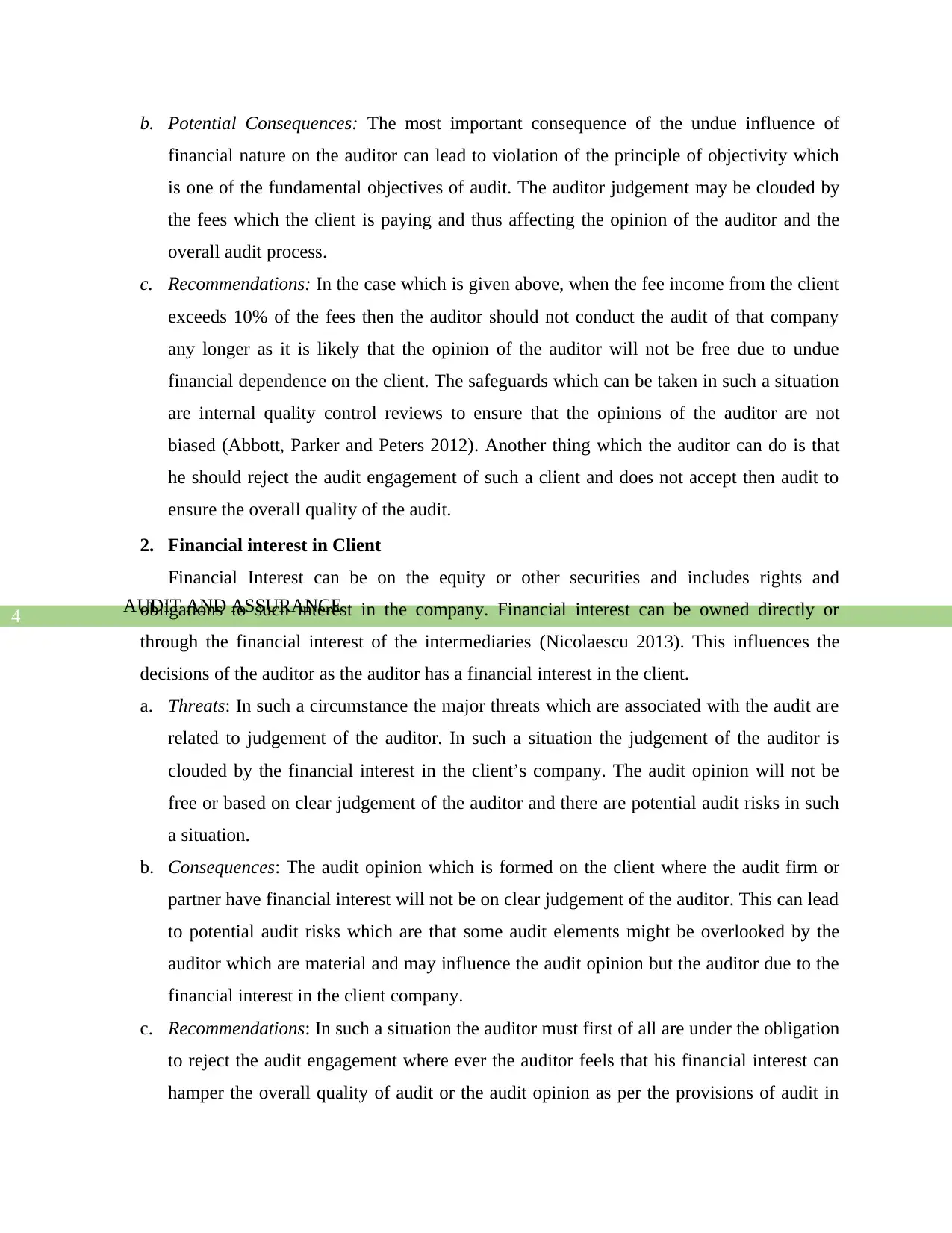
AUDIT AND ASSURANCE
4
b. Potential Consequences: The most important consequence of the undue influence of
financial nature on the auditor can lead to violation of the principle of objectivity which
is one of the fundamental objectives of audit. The auditor judgement may be clouded by
the fees which the client is paying and thus affecting the opinion of the auditor and the
overall audit process.
c. Recommendations: In the case which is given above, when the fee income from the client
exceeds 10% of the fees then the auditor should not conduct the audit of that company
any longer as it is likely that the opinion of the auditor will not be free due to undue
financial dependence on the client. The safeguards which can be taken in such a situation
are internal quality control reviews to ensure that the opinions of the auditor are not
biased (Abbott, Parker and Peters 2012). Another thing which the auditor can do is that
he should reject the audit engagement of such a client and does not accept then audit to
ensure the overall quality of the audit.
2. Financial interest in Client
Financial Interest can be on the equity or other securities and includes rights and
obligations to such interest in the company. Financial interest can be owned directly or
through the financial interest of the intermediaries (Nicolaescu 2013). This influences the
decisions of the auditor as the auditor has a financial interest in the client.
a. Threats: In such a circumstance the major threats which are associated with the audit are
related to judgement of the auditor. In such a situation the judgement of the auditor is
clouded by the financial interest in the client’s company. The audit opinion will not be
free or based on clear judgement of the auditor and there are potential audit risks in such
a situation.
b. Consequences: The audit opinion which is formed on the client where the audit firm or
partner have financial interest will not be on clear judgement of the auditor. This can lead
to potential audit risks which are that some audit elements might be overlooked by the
auditor which are material and may influence the audit opinion but the auditor due to the
financial interest in the client company.
c. Recommendations: In such a situation the auditor must first of all are under the obligation
to reject the audit engagement where ever the auditor feels that his financial interest can
hamper the overall quality of audit or the audit opinion as per the provisions of audit in
4
b. Potential Consequences: The most important consequence of the undue influence of
financial nature on the auditor can lead to violation of the principle of objectivity which
is one of the fundamental objectives of audit. The auditor judgement may be clouded by
the fees which the client is paying and thus affecting the opinion of the auditor and the
overall audit process.
c. Recommendations: In the case which is given above, when the fee income from the client
exceeds 10% of the fees then the auditor should not conduct the audit of that company
any longer as it is likely that the opinion of the auditor will not be free due to undue
financial dependence on the client. The safeguards which can be taken in such a situation
are internal quality control reviews to ensure that the opinions of the auditor are not
biased (Abbott, Parker and Peters 2012). Another thing which the auditor can do is that
he should reject the audit engagement of such a client and does not accept then audit to
ensure the overall quality of the audit.
2. Financial interest in Client
Financial Interest can be on the equity or other securities and includes rights and
obligations to such interest in the company. Financial interest can be owned directly or
through the financial interest of the intermediaries (Nicolaescu 2013). This influences the
decisions of the auditor as the auditor has a financial interest in the client.
a. Threats: In such a circumstance the major threats which are associated with the audit are
related to judgement of the auditor. In such a situation the judgement of the auditor is
clouded by the financial interest in the client’s company. The audit opinion will not be
free or based on clear judgement of the auditor and there are potential audit risks in such
a situation.
b. Consequences: The audit opinion which is formed on the client where the audit firm or
partner have financial interest will not be on clear judgement of the auditor. This can lead
to potential audit risks which are that some audit elements might be overlooked by the
auditor which are material and may influence the audit opinion but the auditor due to the
financial interest in the client company.
c. Recommendations: In such a situation the auditor must first of all are under the obligation
to reject the audit engagement where ever the auditor feels that his financial interest can
hamper the overall quality of audit or the audit opinion as per the provisions of audit in
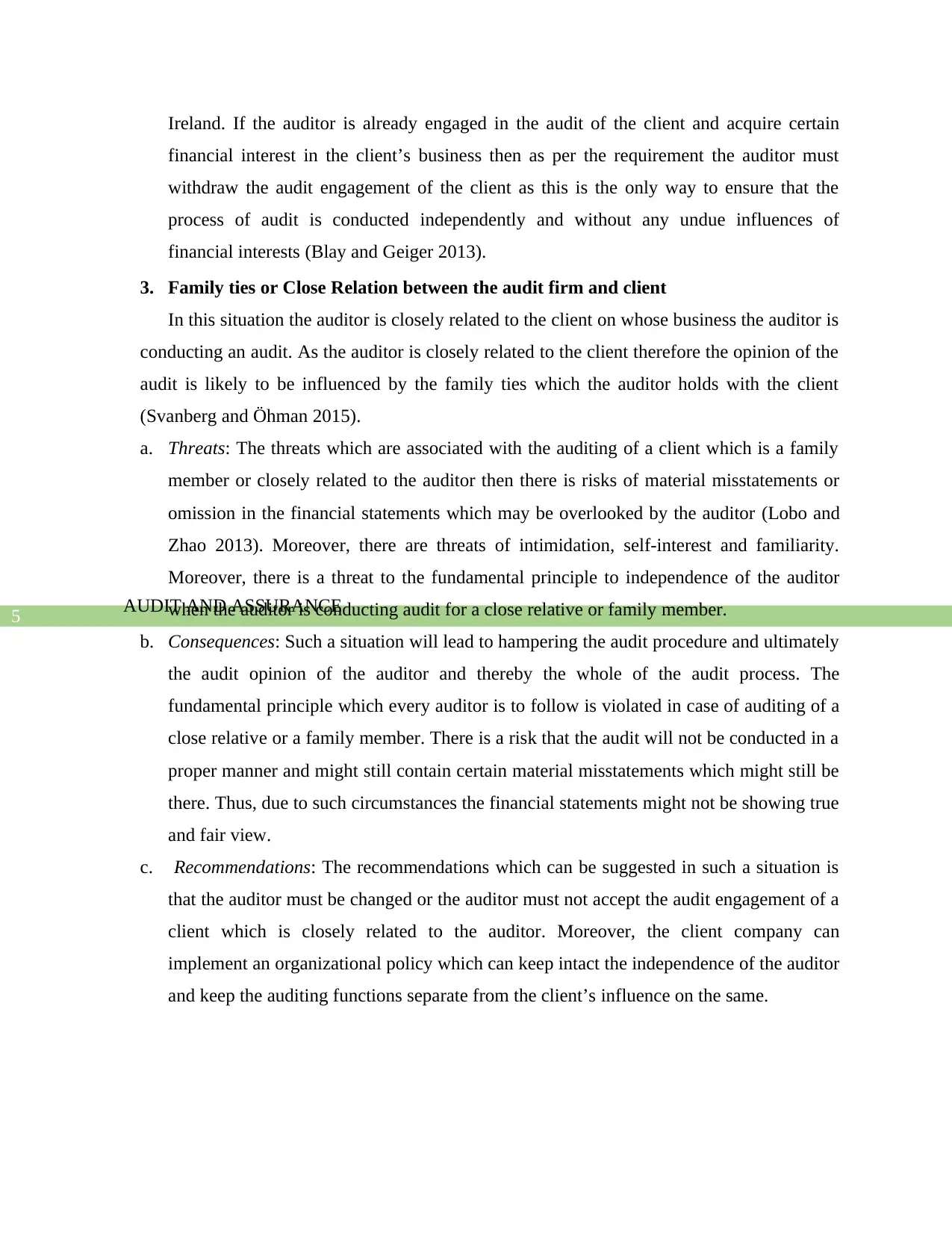
AUDIT AND ASSURANCE
5
Ireland. If the auditor is already engaged in the audit of the client and acquire certain
financial interest in the client’s business then as per the requirement the auditor must
withdraw the audit engagement of the client as this is the only way to ensure that the
process of audit is conducted independently and without any undue influences of
financial interests (Blay and Geiger 2013).
3. Family ties or Close Relation between the audit firm and client
In this situation the auditor is closely related to the client on whose business the auditor is
conducting an audit. As the auditor is closely related to the client therefore the opinion of the
audit is likely to be influenced by the family ties which the auditor holds with the client
(Svanberg and Öhman 2015).
a. Threats: The threats which are associated with the auditing of a client which is a family
member or closely related to the auditor then there is risks of material misstatements or
omission in the financial statements which may be overlooked by the auditor (Lobo and
Zhao 2013). Moreover, there are threats of intimidation, self-interest and familiarity.
Moreover, there is a threat to the fundamental principle to independence of the auditor
when the auditor is conducting audit for a close relative or family member.
b. Consequences: Such a situation will lead to hampering the audit procedure and ultimately
the audit opinion of the auditor and thereby the whole of the audit process. The
fundamental principle which every auditor is to follow is violated in case of auditing of a
close relative or a family member. There is a risk that the audit will not be conducted in a
proper manner and might still contain certain material misstatements which might still be
there. Thus, due to such circumstances the financial statements might not be showing true
and fair view.
c. Recommendations: The recommendations which can be suggested in such a situation is
that the auditor must be changed or the auditor must not accept the audit engagement of a
client which is closely related to the auditor. Moreover, the client company can
implement an organizational policy which can keep intact the independence of the auditor
and keep the auditing functions separate from the client’s influence on the same.
5
Ireland. If the auditor is already engaged in the audit of the client and acquire certain
financial interest in the client’s business then as per the requirement the auditor must
withdraw the audit engagement of the client as this is the only way to ensure that the
process of audit is conducted independently and without any undue influences of
financial interests (Blay and Geiger 2013).
3. Family ties or Close Relation between the audit firm and client
In this situation the auditor is closely related to the client on whose business the auditor is
conducting an audit. As the auditor is closely related to the client therefore the opinion of the
audit is likely to be influenced by the family ties which the auditor holds with the client
(Svanberg and Öhman 2015).
a. Threats: The threats which are associated with the auditing of a client which is a family
member or closely related to the auditor then there is risks of material misstatements or
omission in the financial statements which may be overlooked by the auditor (Lobo and
Zhao 2013). Moreover, there are threats of intimidation, self-interest and familiarity.
Moreover, there is a threat to the fundamental principle to independence of the auditor
when the auditor is conducting audit for a close relative or family member.
b. Consequences: Such a situation will lead to hampering the audit procedure and ultimately
the audit opinion of the auditor and thereby the whole of the audit process. The
fundamental principle which every auditor is to follow is violated in case of auditing of a
close relative or a family member. There is a risk that the audit will not be conducted in a
proper manner and might still contain certain material misstatements which might still be
there. Thus, due to such circumstances the financial statements might not be showing true
and fair view.
c. Recommendations: The recommendations which can be suggested in such a situation is
that the auditor must be changed or the auditor must not accept the audit engagement of a
client which is closely related to the auditor. Moreover, the client company can
implement an organizational policy which can keep intact the independence of the auditor
and keep the auditing functions separate from the client’s influence on the same.
⊘ This is a preview!⊘
Do you want full access?
Subscribe today to unlock all pages.

Trusted by 1+ million students worldwide
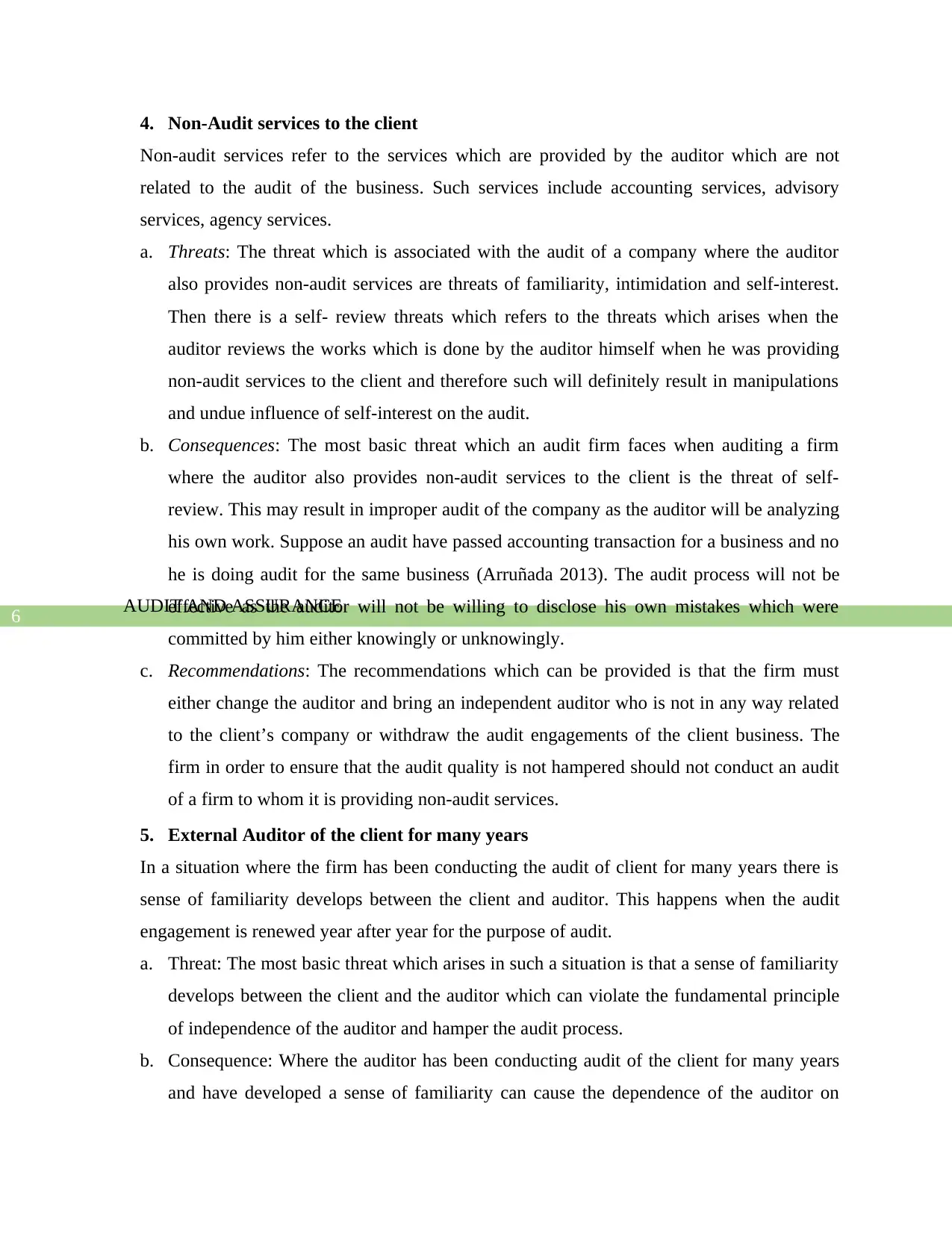
AUDIT AND ASSURANCE
6
4. Non-Audit services to the client
Non-audit services refer to the services which are provided by the auditor which are not
related to the audit of the business. Such services include accounting services, advisory
services, agency services.
a. Threats: The threat which is associated with the audit of a company where the auditor
also provides non-audit services are threats of familiarity, intimidation and self-interest.
Then there is a self- review threats which refers to the threats which arises when the
auditor reviews the works which is done by the auditor himself when he was providing
non-audit services to the client and therefore such will definitely result in manipulations
and undue influence of self-interest on the audit.
b. Consequences: The most basic threat which an audit firm faces when auditing a firm
where the auditor also provides non-audit services to the client is the threat of self-
review. This may result in improper audit of the company as the auditor will be analyzing
his own work. Suppose an audit have passed accounting transaction for a business and no
he is doing audit for the same business (Arruñada 2013). The audit process will not be
effective as the auditor will not be willing to disclose his own mistakes which were
committed by him either knowingly or unknowingly.
c. Recommendations: The recommendations which can be provided is that the firm must
either change the auditor and bring an independent auditor who is not in any way related
to the client’s company or withdraw the audit engagements of the client business. The
firm in order to ensure that the audit quality is not hampered should not conduct an audit
of a firm to whom it is providing non-audit services.
5. External Auditor of the client for many years
In a situation where the firm has been conducting the audit of client for many years there is
sense of familiarity develops between the client and auditor. This happens when the audit
engagement is renewed year after year for the purpose of audit.
a. Threat: The most basic threat which arises in such a situation is that a sense of familiarity
develops between the client and the auditor which can violate the fundamental principle
of independence of the auditor and hamper the audit process.
b. Consequence: Where the auditor has been conducting audit of the client for many years
and have developed a sense of familiarity can cause the dependence of the auditor on
6
4. Non-Audit services to the client
Non-audit services refer to the services which are provided by the auditor which are not
related to the audit of the business. Such services include accounting services, advisory
services, agency services.
a. Threats: The threat which is associated with the audit of a company where the auditor
also provides non-audit services are threats of familiarity, intimidation and self-interest.
Then there is a self- review threats which refers to the threats which arises when the
auditor reviews the works which is done by the auditor himself when he was providing
non-audit services to the client and therefore such will definitely result in manipulations
and undue influence of self-interest on the audit.
b. Consequences: The most basic threat which an audit firm faces when auditing a firm
where the auditor also provides non-audit services to the client is the threat of self-
review. This may result in improper audit of the company as the auditor will be analyzing
his own work. Suppose an audit have passed accounting transaction for a business and no
he is doing audit for the same business (Arruñada 2013). The audit process will not be
effective as the auditor will not be willing to disclose his own mistakes which were
committed by him either knowingly or unknowingly.
c. Recommendations: The recommendations which can be provided is that the firm must
either change the auditor and bring an independent auditor who is not in any way related
to the client’s company or withdraw the audit engagements of the client business. The
firm in order to ensure that the audit quality is not hampered should not conduct an audit
of a firm to whom it is providing non-audit services.
5. External Auditor of the client for many years
In a situation where the firm has been conducting the audit of client for many years there is
sense of familiarity develops between the client and auditor. This happens when the audit
engagement is renewed year after year for the purpose of audit.
a. Threat: The most basic threat which arises in such a situation is that a sense of familiarity
develops between the client and the auditor which can violate the fundamental principle
of independence of the auditor and hamper the audit process.
b. Consequence: Where the auditor has been conducting audit of the client for many years
and have developed a sense of familiarity can cause the dependence of the auditor on
Paraphrase This Document
Need a fresh take? Get an instant paraphrase of this document with our AI Paraphraser
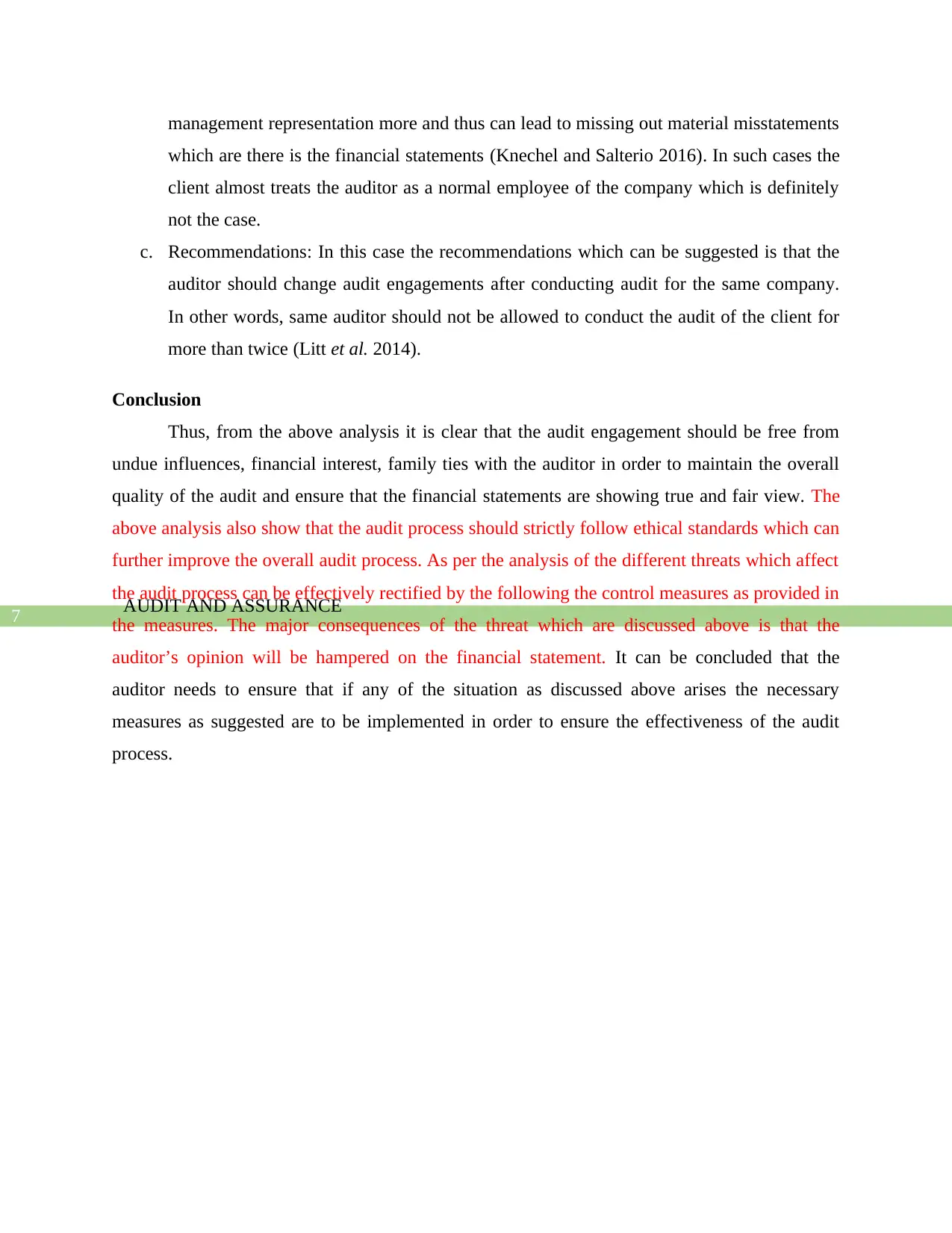
AUDIT AND ASSURANCE
7
management representation more and thus can lead to missing out material misstatements
which are there is the financial statements (Knechel and Salterio 2016). In such cases the
client almost treats the auditor as a normal employee of the company which is definitely
not the case.
c. Recommendations: In this case the recommendations which can be suggested is that the
auditor should change audit engagements after conducting audit for the same company.
In other words, same auditor should not be allowed to conduct the audit of the client for
more than twice (Litt et al. 2014).
Conclusion
Thus, from the above analysis it is clear that the audit engagement should be free from
undue influences, financial interest, family ties with the auditor in order to maintain the overall
quality of the audit and ensure that the financial statements are showing true and fair view. The
above analysis also show that the audit process should strictly follow ethical standards which can
further improve the overall audit process. As per the analysis of the different threats which affect
the audit process can be effectively rectified by the following the control measures as provided in
the measures. The major consequences of the threat which are discussed above is that the
auditor’s opinion will be hampered on the financial statement. It can be concluded that the
auditor needs to ensure that if any of the situation as discussed above arises the necessary
measures as suggested are to be implemented in order to ensure the effectiveness of the audit
process.
7
management representation more and thus can lead to missing out material misstatements
which are there is the financial statements (Knechel and Salterio 2016). In such cases the
client almost treats the auditor as a normal employee of the company which is definitely
not the case.
c. Recommendations: In this case the recommendations which can be suggested is that the
auditor should change audit engagements after conducting audit for the same company.
In other words, same auditor should not be allowed to conduct the audit of the client for
more than twice (Litt et al. 2014).
Conclusion
Thus, from the above analysis it is clear that the audit engagement should be free from
undue influences, financial interest, family ties with the auditor in order to maintain the overall
quality of the audit and ensure that the financial statements are showing true and fair view. The
above analysis also show that the audit process should strictly follow ethical standards which can
further improve the overall audit process. As per the analysis of the different threats which affect
the audit process can be effectively rectified by the following the control measures as provided in
the measures. The major consequences of the threat which are discussed above is that the
auditor’s opinion will be hampered on the financial statement. It can be concluded that the
auditor needs to ensure that if any of the situation as discussed above arises the necessary
measures as suggested are to be implemented in order to ensure the effectiveness of the audit
process.
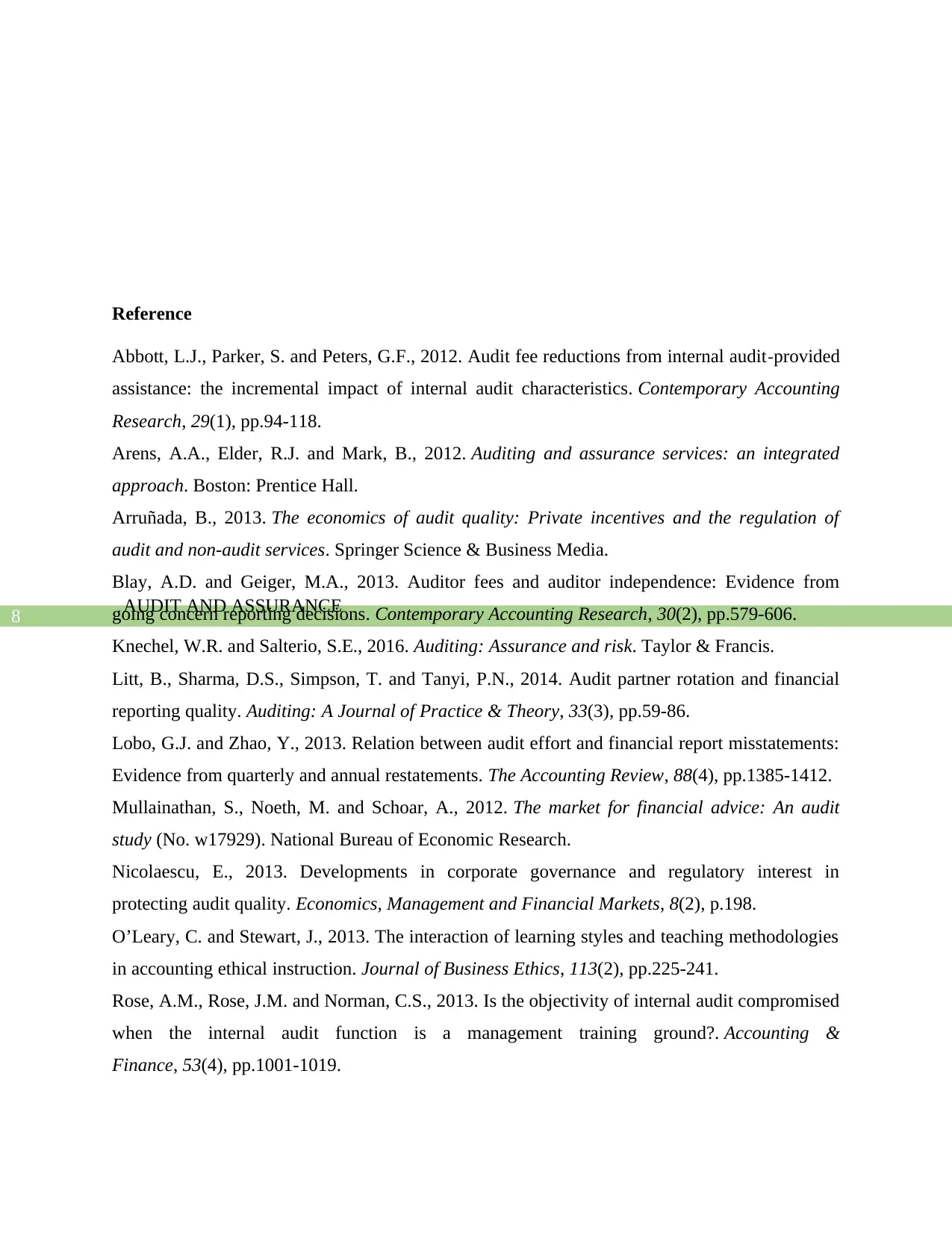
AUDIT AND ASSURANCE
8
Reference
Abbott, L.J., Parker, S. and Peters, G.F., 2012. Audit fee reductions from internal audit‐provided
assistance: the incremental impact of internal audit characteristics. Contemporary Accounting
Research, 29(1), pp.94-118.
Arens, A.A., Elder, R.J. and Mark, B., 2012. Auditing and assurance services: an integrated
approach. Boston: Prentice Hall.
Arruñada, B., 2013. The economics of audit quality: Private incentives and the regulation of
audit and non-audit services. Springer Science & Business Media.
Blay, A.D. and Geiger, M.A., 2013. Auditor fees and auditor independence: Evidence from
going concern reporting decisions. Contemporary Accounting Research, 30(2), pp.579-606.
Knechel, W.R. and Salterio, S.E., 2016. Auditing: Assurance and risk. Taylor & Francis.
Litt, B., Sharma, D.S., Simpson, T. and Tanyi, P.N., 2014. Audit partner rotation and financial
reporting quality. Auditing: A Journal of Practice & Theory, 33(3), pp.59-86.
Lobo, G.J. and Zhao, Y., 2013. Relation between audit effort and financial report misstatements:
Evidence from quarterly and annual restatements. The Accounting Review, 88(4), pp.1385-1412.
Mullainathan, S., Noeth, M. and Schoar, A., 2012. The market for financial advice: An audit
study (No. w17929). National Bureau of Economic Research.
Nicolaescu, E., 2013. Developments in corporate governance and regulatory interest in
protecting audit quality. Economics, Management and Financial Markets, 8(2), p.198.
O’Leary, C. and Stewart, J., 2013. The interaction of learning styles and teaching methodologies
in accounting ethical instruction. Journal of Business Ethics, 113(2), pp.225-241.
Rose, A.M., Rose, J.M. and Norman, C.S., 2013. Is the objectivity of internal audit compromised
when the internal audit function is a management training ground?. Accounting &
Finance, 53(4), pp.1001-1019.
8
Reference
Abbott, L.J., Parker, S. and Peters, G.F., 2012. Audit fee reductions from internal audit‐provided
assistance: the incremental impact of internal audit characteristics. Contemporary Accounting
Research, 29(1), pp.94-118.
Arens, A.A., Elder, R.J. and Mark, B., 2012. Auditing and assurance services: an integrated
approach. Boston: Prentice Hall.
Arruñada, B., 2013. The economics of audit quality: Private incentives and the regulation of
audit and non-audit services. Springer Science & Business Media.
Blay, A.D. and Geiger, M.A., 2013. Auditor fees and auditor independence: Evidence from
going concern reporting decisions. Contemporary Accounting Research, 30(2), pp.579-606.
Knechel, W.R. and Salterio, S.E., 2016. Auditing: Assurance and risk. Taylor & Francis.
Litt, B., Sharma, D.S., Simpson, T. and Tanyi, P.N., 2014. Audit partner rotation and financial
reporting quality. Auditing: A Journal of Practice & Theory, 33(3), pp.59-86.
Lobo, G.J. and Zhao, Y., 2013. Relation between audit effort and financial report misstatements:
Evidence from quarterly and annual restatements. The Accounting Review, 88(4), pp.1385-1412.
Mullainathan, S., Noeth, M. and Schoar, A., 2012. The market for financial advice: An audit
study (No. w17929). National Bureau of Economic Research.
Nicolaescu, E., 2013. Developments in corporate governance and regulatory interest in
protecting audit quality. Economics, Management and Financial Markets, 8(2), p.198.
O’Leary, C. and Stewart, J., 2013. The interaction of learning styles and teaching methodologies
in accounting ethical instruction. Journal of Business Ethics, 113(2), pp.225-241.
Rose, A.M., Rose, J.M. and Norman, C.S., 2013. Is the objectivity of internal audit compromised
when the internal audit function is a management training ground?. Accounting &
Finance, 53(4), pp.1001-1019.
⊘ This is a preview!⊘
Do you want full access?
Subscribe today to unlock all pages.

Trusted by 1+ million students worldwide
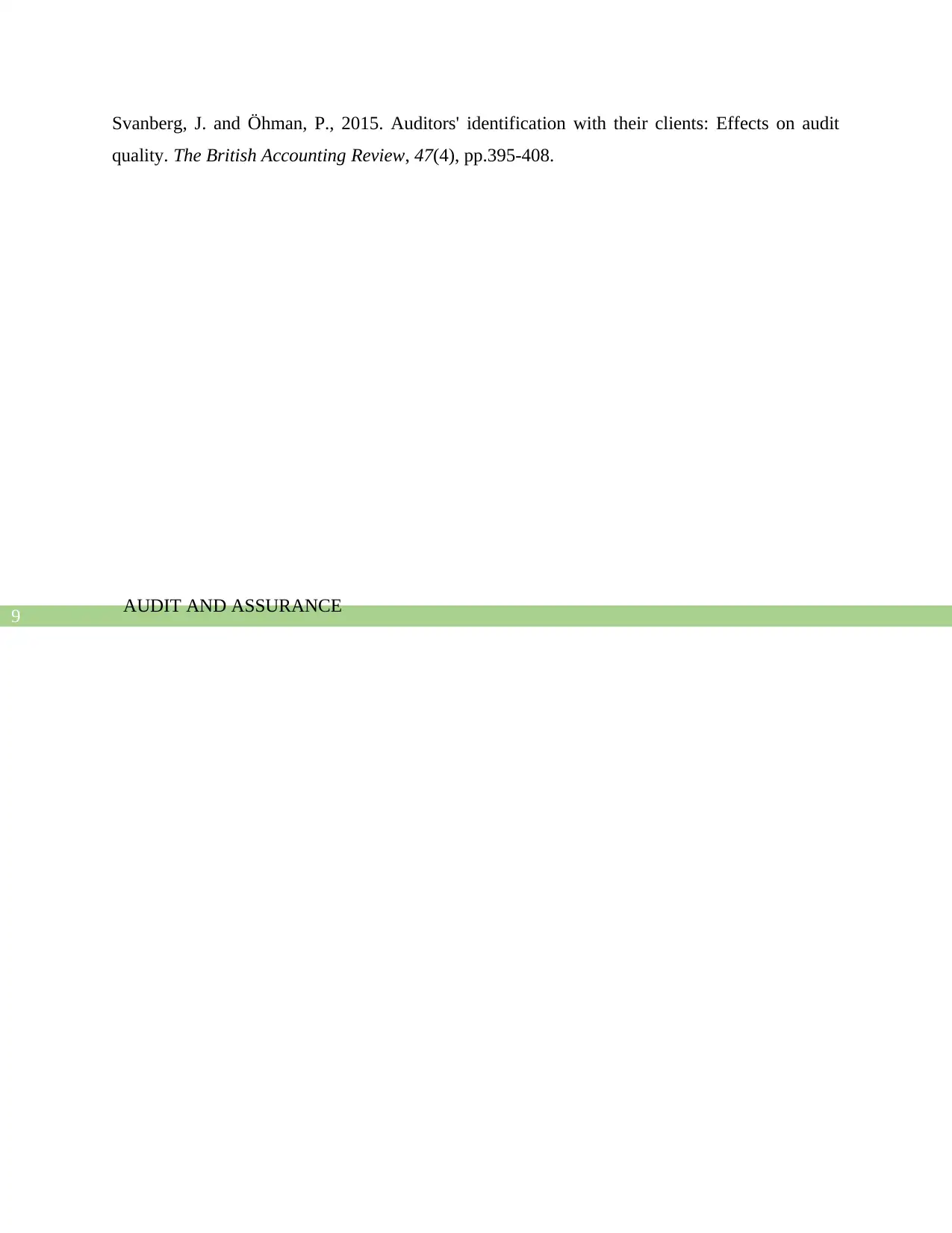
AUDIT AND ASSURANCE
9
Svanberg, J. and Öhman, P., 2015. Auditors' identification with their clients: Effects on audit
quality. The British Accounting Review, 47(4), pp.395-408.
9
Svanberg, J. and Öhman, P., 2015. Auditors' identification with their clients: Effects on audit
quality. The British Accounting Review, 47(4), pp.395-408.
1 out of 10
Related Documents
Your All-in-One AI-Powered Toolkit for Academic Success.
+13062052269
info@desklib.com
Available 24*7 on WhatsApp / Email
![[object Object]](/_next/static/media/star-bottom.7253800d.svg)
Unlock your academic potential
Copyright © 2020–2026 A2Z Services. All Rights Reserved. Developed and managed by ZUCOL.





